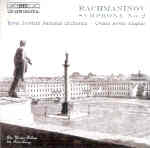Before making a new recording of a warhorse symphony such as this one, the conductor should be chained to a chair and forced to listen to every other available version, then sign a statement that on pain of permanent exile from the studio his new one will be at least as good as the best of the competition. To pretend that everyone has something unique to offer, interpretively speaking, and that this justifies making a new recording simply because one performance differs from another in detail, is sheer arrogance compounded by ignorance. And that’s assuming the performance is destined to be a competitive one, and not the excruciating treatise in dullness on offer here.
At more than 67 minutes interminable duration, this must be the slowest performance of this symphony currently available. I can accept the very measured first movement introduction, but when the ensuing allegro moderato shows scarcely any contrast, then we have a problem. And when the second subject fails to differentiate itself in any significant way from the first subject, the problem becomes a crisis. And when, after a seemingly endless cadence theme to close the exposition conductor Owain Arwel Hughes opts to observe the repeat, thereby extending the timing of the movement to more than 25 minutes, the crisis becomes a catastrophe.
But the problems go beyond matters of mere tempo. Hughes and his players operate within a narrow range of dynamics too. Listen to how undramatic the doleful reappearance of the symphony’s “motto” theme sounds in the development section, and to those under-accented viola riffs that ought to energize the texture. The movement’s climax is so well recorded that you may not notice how little tension Hughes generates getting there, and while the return of the second subject features gorgeously serene string playing, such expansiveness and comparative lack of passion might have made a better impression had there been some contrast in surrounding sections.
The scherzo probably comes off best, at a normal speed with nicely rhythmic phrasing, but the very slow Adagio (a hair over 16 minutes) meanders like a swamp, its long melodic lines stagnating for lack of a firm guiding hand. And the finale completely hangs fire, criminally under characterized and so lacking in energy, collapsing under the weight of the many repetitions of its main theme. Don’t get me wrong here: you can play this music slowly. Rozhdestvensky, Sanderling, and Svetlanov all get away with it because they use the extra time they gain to enlarge the music’s dynamic range, explore frequently overlooked instrumental details, and intensify the climaxes. In short, they keep the ear engaged. Hughes and company offer nothing but a generalized, placid mellowness, and in this symphony, at least, such an approach proves fatal.
































